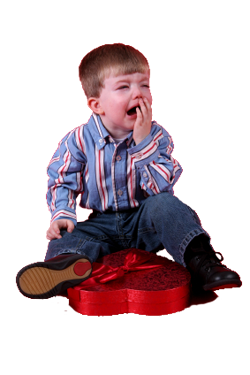 Given an opportunity to eat, most of us will do just that, even if we're not hungry. Often, we eat because we think we should, because others are eating, because we're feeling anxious, angry or depressed or because we're not thinking at all.
Given an opportunity to eat, most of us will do just that, even if we're not hungry. Often, we eat because we think we should, because others are eating, because we're feeling anxious, angry or depressed or because we're not thinking at all.
And then there's Valentine's Day, when reminders abound that we're all supposed to be in romantic relationships. The social norms and heightened emotions can drive people to overeat, especially "simple" or refined carbohydrates, such as sugary foods, sweetened drinks, white bread and baked goods. And then there are all those Valentine's chocolates.
In short, we might be well-informed about healthy eating, but when emotions enter into the picture, we tend to overeat and make poor food choices.
"Behaviour changes are more important than caloric changes when it comes to long-term weight management," says Nishta Saxena, a Clinical Dietitian who works with a variety of heart patients at the Peter Munk Cardiac Centre's Cardiac Rehabilitation Program. She also says that January and February tend to be the busiest months of the year for dietitians as people struggle with New Year weight-loss resolutions.
Saxena aims to help patients overcome mindless eating and address eating behaviours. She asks patients to keep a food journal, recording what they eat, how they feel before and after, who they're with, the pace at which they ate, and so forth. In this way, she helps patients pinpoint the source of unhealthy eating habits and creates individualized strategies to help change them.
"I ask patients to choose one goal," she says, noting it takes at least 28 days to develop a new eating habit. "For example, for those who eat in the car on the way home from work, I suggest to them to change that one behaviour, and be consistent with that change, even if they eat the same thing at every other meal."
It's normal to overeat during times of unusual stress, celebrations or special occasions, like the holiday season and, of course, Valentine's Day, and then feel a little guilty about it. Sometimes, however, these small behaviour patterns take on more extreme forms. For people with dysfunctional eating patterns or eating disorders, feeling guilty after eating is a regular occurrence and may be accompanied by feelings of shame, discomfort and even pain.
"It's important to remember that food has no power, we give it power – good or bad," says Merryl Bear, Director of the National Eating Disorder Information Centre at TGH, pointing out that it's normal and healthy to eat food for pure pleasure.
How do you know when guilt over that extra cookie has tipped into dangerous territory?
"If thoughts of food are consuming you and preventing you from leading an energetic, healthy and happy life," says Bear, "it may be helpful to work with a professional to address these issues."
The National Eating Disorder Information Centre's third bi-annual conference: Body-Image and Self-Esteem: Shades of Grey
May 2-3, 2011
89 Chestnut Conference Centre
Toronto, ON
Topics include:
- Mindfulness and emotional development
- Weight-focused bullying
- Binge-eating: understanding and working with it
- Packaging Girlhood: media and marketing influences on girls
Details of the conference can be found at http://nedic.ca/2011ConferenceIntro.shtml
